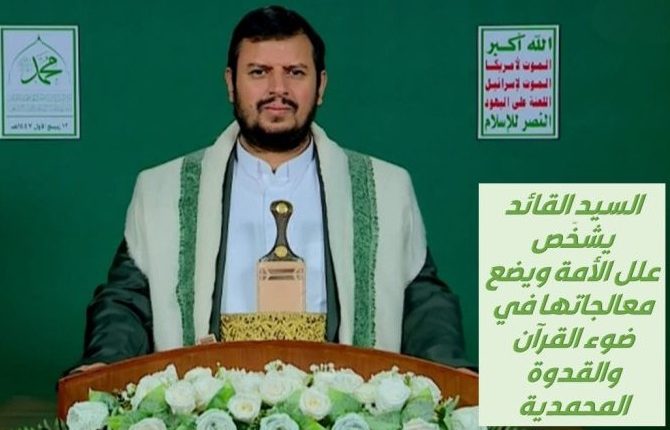The Leader Diagnoses the Ummah’s Ailments and Proposes Remedies in Light of the Qur’an and the Prophetic Example
In a deeply faith-based and political address, the leader of the revolution, Abdul-Malik Badr al-Din al-Houthi, spoke to millions of Yemenis and Muslims on the occasion of the Prophet’s birthday. He presented a precise diagnosis of the exhausted and fragmented condition of the Ummah and clearly identified the faults that have led Muslims into a state of subordination and defeat in the face of the Ummah’s enemies.
The leader did not stop at diagnosis; he laid out a practical vision and clear remedies centered on returning to the Qur’an and emulating the Messenger of God (peace be upon him and his family) as a way of life. He affirmed that this return is the sole path to restoring dignity and honor and to confronting the forces of global arrogance, foremost among them the United States and Israel.
The State of the Ummah — Subjugated under External Domination
The leader plainly diagnosed today’s Muslim world as suffering humiliation and domination as a result of its distance from God’s Book. He said many rulers have become instruments in the hands of the powerful, turning the Ummah’s resources and political decisions into hostages of American and Zionist will.
He noted that this reality is not inevitable; rather, it is the outcome of misguided policies and serious deviations from the divine path, which have disabled the Ummah’s vast potential, fragmented its unity, and transformed it into a theater of conflict and chaos that serves the enemies’ interests.
The Absence of the Qur’an as a Way of Life — The Root of the Affliction
The leader stressed that the Ummah’s departure from the Qur’an is the fundamental cause of its weakness and dispersion. He emphasized that the Qur’an was not revealed merely to be read on occasions or recited unconsciously, but to be a guide and a practical methodology that directs life in all fields.
He pointed out that sidelining the Qur’an’s role left the Ummah vulnerable to foreign ideas and cultural and political dependency, enabling the enemies to infiltrate its structures and control its destiny.
The Prophetic Example — The Practical Model for Revival
Alongside the Qur’an, the leader regarded emulation of the Prophet (peace be upon him and his family) as the second pillar for addressing the Ummah’s condition. The Prophet, he said, was not merely a spiritual figure but a comprehensive model for state building, establishing justice, confronting tyranny, and forging a strong nation.
He explained that returning to the prophetic biography in a living, practical sense — not merely in theoretical or ceremonial terms — provides the Ummah with a clear roadmap to revive its dignity and reclaim its civilizational role.
Practical Remedies — From Speech to Project
The leader went beyond warnings and proposed a set of practical measures the Ummah can pursue to restore its standing, notably:
-
A serious return to the Qur’an as a comprehensive life-methodology, treating it as a source for legislation and civilizational construction.
-
Emulation of the Prophet in practical stances: perseverance, struggle, societal building, and facing the forces of falsehood.
-
Unity founded on the Qur’anic project, distancing the Ummah from sectarian and nationalist loyalties that have torn it apart.
-
Liberation from dependency on enemies and attainment of independent political and economic decision-making to restore sovereignty.
-
Practical mobilization to confront the forces of global arrogance, foremost among them the United States and Israel, framing confrontation with them as a measure of sincerity in one’s Islamic affiliation.
A Message to the Ummah — The Mawlid as a Launching Point
The leader affirmed that the Prophet’s birthday is not merely a religious occasion for rituals and celebrations, but a renewed station to revive the relationship with the Messenger and to renew commitment to the Qur’an, launching a practical project that restores the Ummah’s role.
He concluded by urging the Muslim community to seize this solemn occasion to undertake serious corrective action, drawing inspiration from the Prophet’s spirit of sacrifice and struggle. He affirmed that Yemen, through its Qur’anic revolution, stands present on this path and is part of the Ummah’s decisive struggle against the forces of global arrogance.

